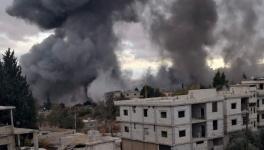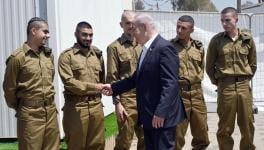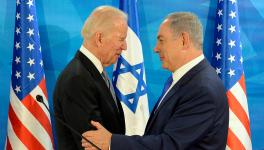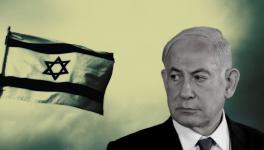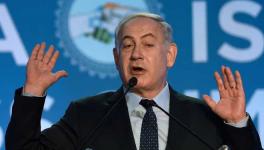Russia-Israel Ties are Like Matryoshka Dolls
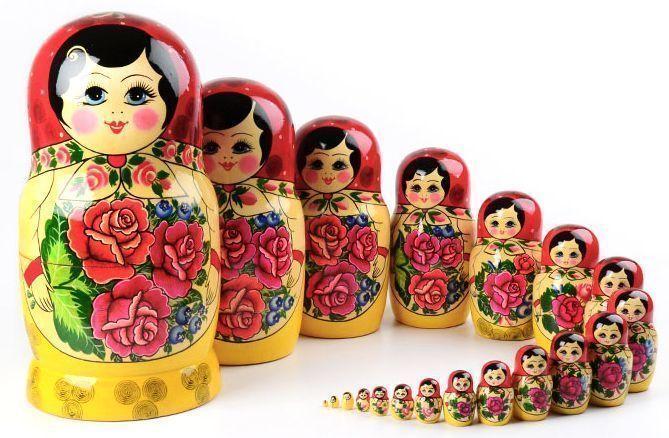
Traditional Matryoshka nesting dolls in a Moscow store
It does not take much effort to plant a rumour in West Asia. There is no other region where, perhaps, rumours are the lifeblood of politics and politics is the stuff of rumours. A rumoured crisis in the Russia-Israel relationship is making waves lately.
It all began with a report in the Saudi establishment daily Asharq Al-Awsat two weeks ago with Moscow dateline based on certain statements by the Russian Defence Ministry regarding the latest Israeli air raids on a research center in Aleppo and a site for Iranian forces in al-Qusayr, both in Syria.
According to the Saudi daily, the Russian defence ministry “never previously commented on Israeli raids” on Syria but this time around, it issued two statements. They referred to Israel’s “continuous attacks on Syrian sovereignty” and, importantly, commended the success of the Syrian air defences in countering the two Israeli attacks and the missiles.
The Asharq Al-Awsat cited a “well-informed Russian source” in Moscow as saying that the Israeli attacks are “no longer effective because the Syrian anti-aircraft systems have been enhanced, and Moscow provided Damascus with air defence equipment.” The source claimed that this signified “a shift in how Moscow addresses the Israeli attacks,” and it followed the US-Russia summit in Geneva on June 16 where the Russian side began sensing that “Washington does not welcome the continuous Israeli raids” on Syria. read more
To be sure, a narrative was born in no time that Russia is moving to change the “rules of the game” in Syria. Russia and Israel do have a complicated history of messaging to each other. Indeed, the Russian-Israeli tango in Syria draws comparison with matryoshka nesting dolls — a set of wooden dolls of decreasing size placed one inside another.
The tango dates back to the Russian intervention in Syria in 2015 when the two countries established a so-called deconfliction mechanism to keep them from getting tangled up. The full extent of the coordination is not in public domain, but at its core, Israel does not seek Russian permission before carrying out operations directed against Iranian assets and proxy militias in Syria.
Russia’s acquiescence to Israel’s freedom of action remains a mystery because Moscow periodically signals unhappiness about the Israeli strikes in Syria. It could be that other factors came into play in the Russian calculus. And there are any number of them starting from former Israeli Prime Minister Netanyahu’s exceptionally close personal rapport with President Putin.
Conceivably, Moscow was in awe over the magical spell that Netanyahu cast over the Trump administration. Netanyahu made it a point to touch base with Putin with a frequency that has few parallels in inter-state diplomacy. He made sure that the strategic communication at the highest level of leadership was kept up at an intense pace.
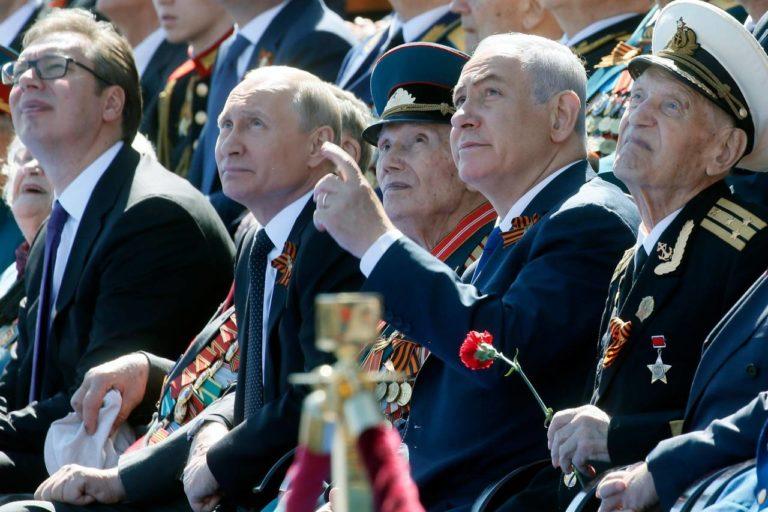
Russian President Vladimir Putin (second from left) and Israeli Prime Minister Benjamin Netanyahu watch the Victory Day military parade at Red Square, Moscow, May 9, 2018.
To my mind, it is improbable that President Biden threw Israel under the bus at the Geneva summit. That degree of candour and trust simply is not there in the US-Russia high-level exchanges. On the contrary, the US is supportive of Israel’s moves to scatter any Iran-backed “resistance front” on Syrian soil. Equally, the US resents the Russian military bases in Syria and their projection of power into the Eastern Mediterranean.
The heart of the matter is that too many variables have appeared in the regional landscape that threaten to render obsolete the old working arrangement between Russia and Israel. Biden’s Syria policy has not yet crystallised; the situation around Iran is rapidly transforming and with that the US-Iran relationship may take a new trajectory; there has been change of governments in Israel and Iran; a reset is under way in US-Israel relations; fault lines have appeared in Russia’s equations with Damascus; the limits of Russian power in Syria as the Arab world’s overtures to Damascus get under way; Israel-Turkey alienation is mellowing, and so on.
Most important, the Syrian situation is showing disturbing signs of a descent back into violence, especially in the southwestern region of Daraa, which is not far from the Israeli border, where the Iranian and Russian priorities seem to be working at cross purposes and the Syrian regime finds itself over-stretched to reassert power. read more
Without doubt, Israel is a stakeholder in what happens in Daraa. As a commentary by Jerusalem Post puts it, “The Iranians and their proxies have never abandoned their grand plan to establish a presence in southern Syria, close to the border with Israel. If Russia gives up Daraa, it might suffer reputational damage in Syria and a blow to its strategic interests, since takeover of the city by Syrian government forces and pro-Iranian militias would create a new reality in the region.
“One possible consequence might be a change in Israeli military strategy toward the developments in southern Syria that would further complicate the situation and likely put increased strain on Russian-Syrian relations.” read more
Again, while Russian experts sound confident that under President Ebrahim Raisi Iran’s foreign policy will pivot towards China and Russia, in reality, the ascendance of the forces of hardline “resistance” politics in Tehran must be worrying Moscow. On the other hand, tensions between Iran and Israel have flared up lately. And Syria is one theatre where these tensions play out.
Against this highly volatile backdrop, Moscow is left guessing about Naftali Bennett. Bennett appears to be “more American” than Netanyahu as prime minister. He is carefully bending in the direction of the Biden administration by staking claim that his history is America’s history and his values are American values — his democratic discourse, his value of diversity and so on.
Bennett is the first Israeli prime minister to have American parents and a family with US roots that go back more than a century. Clearly, Bennett is destined to become the new face of Israel for the American public.
The bottom line is that in a trademark diplomatic move, Moscow has nudged Israel with a vague hint at precipitating a review of the “rules of the game” in Syria, but with the broad intention to engage with the Bennett government in a constructive spirit. Israel is familiar with the Russian diplomatic toolbox; it took note of the Russian prompting and has responded swiftly.
Tass news agency reported on Tuesday that “closer cooperation between the Russian and Israeli security services was the focus of a meeting” in Moscow earlier in the day between Russian Security Council Secretary Nikolai Patrushev and his new Israeli counterpart Eyal Hulata (who was accompanied, interestingly, by the outgoing chairman of the Israeli National Security Council Mair Ben-Shabbat.)
A readout by the Russian Security Council said, “The sides reiterated plans for further expansion of Russian-Israeli cooperation, and discussed in detail issues of cooperation between the security councils and special services, with a focus on combating international terrorism.
“The sides exchanged views on the situation in the Middle East and on the settlement of a number of regional conflicts… Nikolai Patrushev… expressed the hope for continuity in Russian-Israeli contacts in the area of security.” Ben-Shabbat reportedly thanked the Russian side for “fruitful cooperation on the most pressing problems” on the international and regional agenda.
The coordination between Moscow and Tel Aviv Israel on Syria doesn’t appear to be in jeopardy. Moscow is unlikely to pull the plug on its coordination with Israel, but an upgrade of the understanding with Netanyahu is unavoidable as Russian diplomacy keeps manoeuvring amidst so many variables.
Moscow made sure that a dialogue has begun with the new government in Israel before Bennett embarks upon his much-awaited visit to the US shortly where Syria and Iran are sure to figure in the agenda of discussion.
Putin himself has invested heavily in the relationship with Israel. And there are influential figures in the Bennet government — Finance Minister Avigdor Lieberman, for instance — who have actively fostered the warm and close ties between the two countries.
Like in a Matryoshka doll, there are hidden mysteries too, which we may never get to know. It is well-known that Israel gives safe haven to Russian oligarchs – more so after the crackdown on money laundering by Cyprus in line with the EU moves against Moscow.
Get the latest reports & analysis with people's perspective on Protests, movements & deep analytical videos, discussions of the current affairs in your Telegram app. Subscribe to NewsClick's Telegram channel & get Real-Time updates on stories, as they get published on our website.









